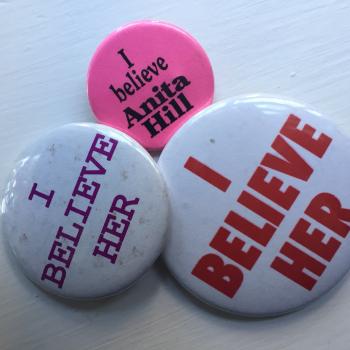Writing for popular audiences was a conscious decision that I made early in my career on the basis of my identity as a feminist, an activist, and a scholar. In addition to furthering the conversation in my field, my books are written to be accessible more broadly to educated audiences.
As a feminist Christian social ethicist, I write on contemporary social issues with the hopes of helping to offer new insights into seemingly intransigent social problems by offering historical context, reframing social problems, exploring alternative ways to think about issues within the Christian tradition – and always, always attempting to bring an intersectional (race, class, gender, sexuality) analysis to discussions of social issues.
However, fewer and fewer people read books and increasingly people are looking to the internet and their facebook feeds for information and analysis about social issues.
As an ethicist who seeks to speak to the contemporary justice issues that face us as a society – it seemed time to start blogging. So, last February while on sabbatical, I started this blog “To Do Justice.” My goal is for this to be a space to talk about contemporary social problems in more critically sophisticated and nuanced ways than mainstream media sometimes allows.
Developing a social justice community means that we need to be able to talk about difficult issues in respectful and constructive ways. The topics that I write about are often controversial – abortion, racism, economic inequality, capitalism, poverty, violence, patriarchy, misogyny, heterosexism – I could go on and on but I think you get the point. The question is – can we do that on the internet?
It is possible to be committed to social justice and to think differently about issues. In fact, it is not only possible – it is likely. Even if we are committed to a common goal, we might also disagree about the means to get there. For example, we might be able to develop a broad consensus that poverty is bad but disagree about what are effective public policy solutions to reduce poverty.
Other times, we might be able to agree on common strategies to address particular social problems (like the high rate of unplanned pregnancies), even if we don’t agree about related social questions (like the morality of abortion). Along the way, we may need to have some difficult conversations.
If we seek to develop relationships of solidarity across lines of difference, the subject of my book Solidarity Ethics, we need to be able to engage in constructive and respectful civil discourse. Some will argue that this isn’t possible in the blogosphere or on the internet at all.
My hope is that we can. My hope is that this blog might be a space where I put out ideas and this community is able to debate them in respectful ways that allow for productive dialogue rather than shaming, blaming, and ad hominem attacks on people’s character. Productive dialogue is essential for democracy and we need to cultivate new spaces and places for genuine and productive dialogue to take place.
To this end, I have agreed to pilot a new commenting system on my blog known as the “World Table” commenting system. I am actually very excited about this new system because it asks the community of readers and commenters to participate in building up a commenting platform that is respectfully critical and critically respectful.
The way the system works is this – readers get to “rate” or “score” the comments of others along a basis of “respectful,” “helpful,” “honest,” and “likeable.” This system allows the readers of this blog to develop a respectful culture of dialogue by offering constructive feedback on the kind of public dialogue that we wish to be part of in this blog space.
In my “comment policy” I have asked that this space be a place of respectful dialogue and I have put people on notice that I reserve to the right to delete comments that I read as disrespectful (of me or of others). I have defined “disrespect” as comments that are “mean, spiteful, racist, sexist, or other hateful attitudes that target individuals or groups of people.” I have deleted comments and I will continue to delete comments, but it is my hope that this commenting platform will allow the community to be more active participants in developing the conversation around controversial issues.
This new platform will “hide” comments that are rated lower so that the whole community won’t have to see them. In this way, if you encounter offensive or disrespectful material – you can respond by “rating” that comment and helping to “remove” it from the comment feed. It will still be there if someone wants to click on it and see what someone has said, but others who come to the site after you may not have to worry about being exposed to material that is offensive.
In addition to the individual rating of comments, commenters will develop “scores” over time. People whose scores fall below a certain level will not be able to continue to participate in the conversation. Trolls be gone!
The point of this software is to manage the tone of the conversation, not to prevent people from participating in robust disagreement. For those who are really interested, you can find out more details here.
I hope you will join me in seeing this new platform as an opportunity to shape this space as an online community of civil discourse. In order for this to happen, I need your help. Please take the time to rate comments and help us create a space for robust and respectful dialogue.













